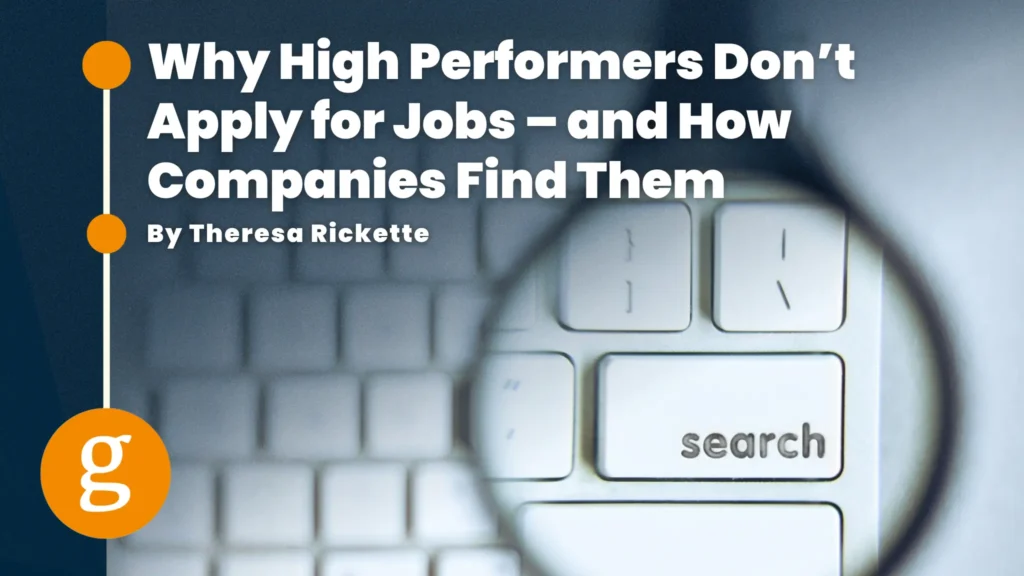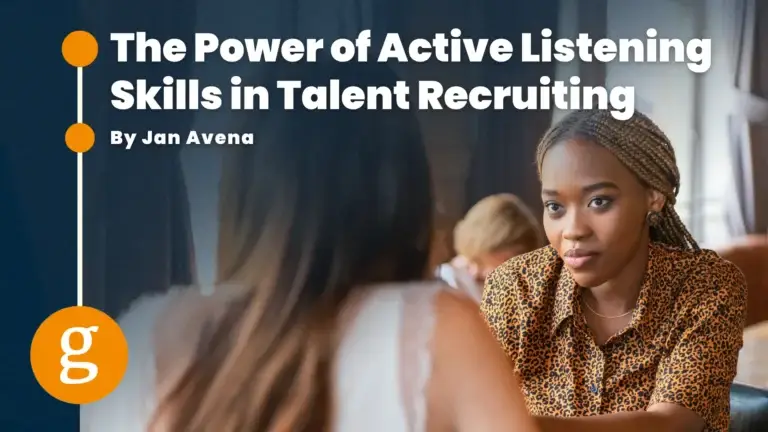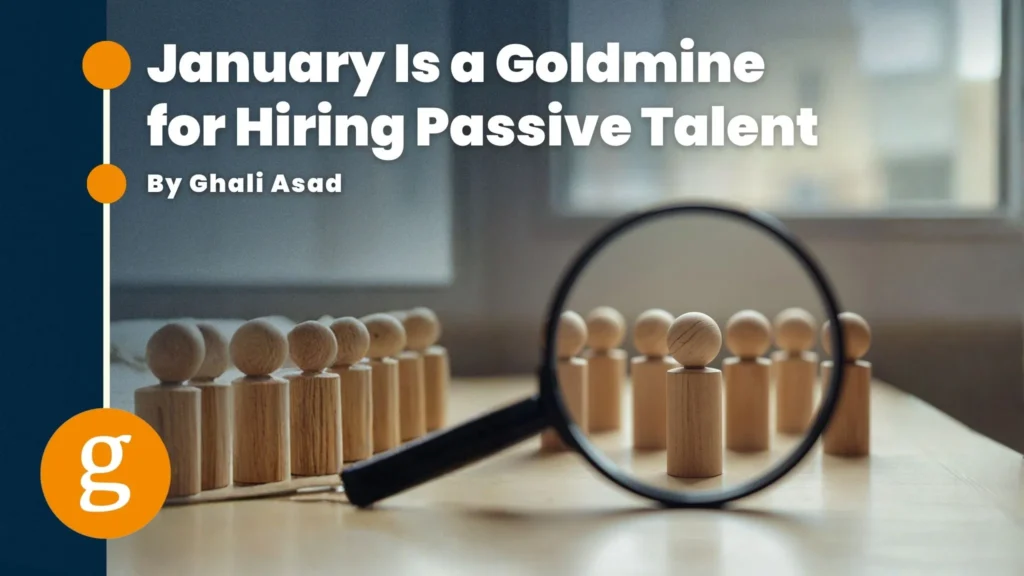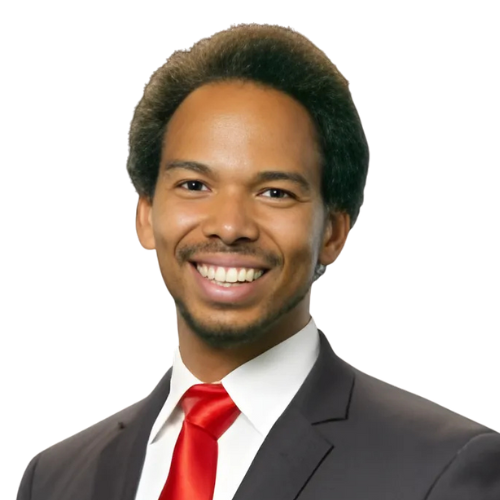Purposeful Hiring: Exploring How to Interview Candidates Well
Goodwin Recruiting | Hiring Advice, Leadership, Opinion | January 9, 2024
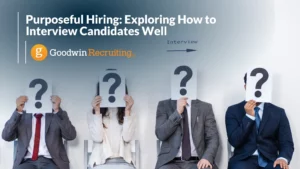
If you’re wondering how to interview candidates well, don’t worry, you’re not alone. There’s no one-size-fits-all solution for this crucial step in the recruitment process. Each position you’re hiring for comes with its own unique set of duties, responsibilities, tasks, skills, and qualifications. On top of that, you need to consider the qualities a candidate requires to thrive in the role, such as cultural fit, performance standards, leadership potential, and capacity. This is why many hiring teams and recruiters, regardless of their experience, find this step to be quite challenging.
Figuring out how to conduct a great interview is an ongoing journey. If done without a clear purpose, this stage can eat up time and money, particularly when candidates don’t ultimately last in the position. Therefore, it’s not just about conducting an interview, but rather about identifying the top candidates from the good ones. In this blog, we’ll discuss ways to enhance your interview process and select the best candidates for your team. We’ll keep it simple, so no matter what role you’re hiring for, these tips will be relevant along the way.
Planning Interviews: Align your Business Goals
A well-planned interview process makes sure that hiring aligns with the organization’s big-picture goals and what it’s aiming to accomplish. Simply put, you need to understand the role you’re trying to fill – the day-to-day tasks, the work environment, and the type of people who would thrive in that role – and how it will help achieve the company’s objectives. Is this a brand-new role or has it changed over time? Are you creating a new position to handle more work, or merging two roles into one? Having this info is crucial for finding the right person for the job.
When you thoroughly examine the job(s) within your company, it’s known as a job analysis. The information gathered from a job analysis is incredibly valuable for almost every aspect of HRM. It not only provides a clear understanding of the required qualifications and skills, but also helps in assessing if candidates are a good fit for the company culture, values, and if they have leadership potential. By using a job analysis to understand what it takes to succeed in the role, you can plan effective interviews that truly evaluate a candidate’s performance potential.
How to Formulate Questions for an Interview
When it comes to interviewing, asking the right questions is key to understanding a candidate’s skills, experiences, and how well they fit with your company culture. By planning your interviews thoughtfully, you’ll know exactly what kind of questions will help you get the most out of the conversation. Keep in mind that the interview is a two-way street – not only are you setting expectations for the role, but you’re also showcasing your company to top talent.
When you’re looking for top candidates, chances are they’ve already got offers from other companies by the time you schedule an interview. So, this process is their chance to see if your company is the right fit for them. That’s why it’s crucial to make candidates feel respected and valued every step of the way, and why asking clear, insightful questions during the interview is essential – it demonstrates how much you appreciate the skills for the role. According to Workleap, 15% of candidates who have positive hiring experiences put in more effort on the job. With that in mind, here are some tips to help you come up with meaningful and relevant interview questions:
- Understand the Job Requirements
- It can’t be stressed enough how important it is to know what it is you are trying to accomplish with the role. This is key in determining the top talent from the good talent. As a rule of thumb, always revert back to your job analysis for clarity on what you need.
- Relate Questions to Core Competencies
- Make sure your interview questions match the essential skills and abilities needed for the job. This way, you can see if candidates have what it takes to succeed in the role. Just keep your questions balanced and avoid guiding the candidate toward a specific answer. That’s the best way to get honest responses and lower the chance of bias.
- Focus on Specific Examples:
- You should ask candidates for specific examples from their past experiences. This way, you can really gauge their abilities based on real situations and actions instead of just hypothetical answers.
- Assess Cultural Fit
- Include questions that explore how well the candidate would fit into your company culture. This might include asking about their work style, experiences working in teams, and values that match your organizational values.
- Probe for Problem-Solving and Critical Thinking
- Be sure to ask questions that enable candidates to show their problem-solving and critical-thinking skills. It’s a good way to see how they handle challenges and make smart decisions.
- Incorporate Future-Oriented Questions
- Ask candidates about their goals, career aspirations, and how they envision themselves contributing to the organization. This will give you a good sense of whether they’re a good long-term fit.
- Test Technical Competence
- When interviewing for technical positions, make sure to ask questions that test the candidate’s technical know-how and problem-solving skills. You might also want to try practical exercises or case studies to see how well they can apply their skills in real-world scenarios.
- Encourage Questions from Candidates
- Give candidates the chance to ask questions. What they ask can give you a good idea of how interested and prepared they are, and how well they understand the role and the company.
Before you lock in your questions, try them out with a colleague or team member to get their thoughts and make sure they’re clear and on point. By putting effort into your interview questions, you set up a system that really gives you the info you need to evaluate candidates well and make smart hiring choices.
How do you evaluate interview performance?
The way companies handle interviews can be different. Some have a bunch of people assessing candidates, while others just have one hiring manager. This means that different folks might have different takes on a candidate, which can make it tricky to figure out who’s the best fit for the job. But it’s super important to evaluate how people do in interviews so that we can make smart hiring choices and pick candidates who really match what the company needs.
To improve how you assess and select candidates, consider establishing a scoring system for interviews. This system should outline the objectives for evaluating each candidate, starting with a review of the job analysis and the key qualities needed for success in the role. This provides a basis for gauging the candidate’s suitability. You can then incorporate the following suggestions to better identify the most suitable candidate based on their interview performance:
Factor in Team Dynamics:
How well a team works together really affects how individual team members collaborate and communicate. So, when we’re checking out a new team member, we want to make sure they’ll fit in well and keep the good vibes going. Plus, when everyone understands each other’s strengths and weaknesses and knows how to use them, the team gets more done. Considering how a new person will blend into the team can really help make work go smoother and be more productive.
Positive team dynamics play a big part in keeping employees engaged and satisfied with their work, which helps with retention and overall job satisfaction. When a new team member fits in well, they’re more likely to enjoy their job and stick around, which is crucial for keeping things running smoothly.
Thinking about how well someone will fit in with the team when you’re hiring is super important for creating a strong, unified group that really gets things done. It’s all part of making a great work environment, working well together, and making the whole company a success.
Remove Bias
Organizations should focus on making the candidate evaluation process more inclusive and unbiased, which can lead to fairer hiring outcomes and a diverse, talented workforce. Continuously reviewing and improving these practices shows a commitment to reducing bias in hiring.
When you’re reviewing interviews, try doing blind resume reviews where you redact personal info like names, age, race, etc. This can stop unconscious biases based on demographics. Make some standard ways to evaluate people that focus on job skills and abilities. And train the interviewers to use these methods consistently. It’s also a good idea to give the interviewers some training on unconscious biases. This can teach them about common biases and how they affect decisions, which helps build a more aware workplace culture.
Make sure to use the same evaluation criteria for all candidates and steer clear of changing them based on personal preferences. This will keep things fair for everyone. Also, keep an eye on the latest best practices for reducing bias in hiring and be open to feedback to keep improving the process.
Consider Multiple Data Points:
When evaluating interview performance, make sure to gather information from different sources like resumes, interviews, assessments, and reference checks. You should use a variety of assessment methods, like skills tests, situational judgment tests, and work samples, to get a well-rounded view of a candidate’s abilities. Additionally, it’s important to develop standardized evaluation criteria focusing on job-related skills and competencies. Once this process has been standardized, it’s helpful to also provide training to your evaluators on consistently using the criteria.
Conclusion
Learning how to interview candidates well really gives your organization an edge. It helps you make smarter hiring choices and fosters a positive team culture. Sharpening your interviewing skills is a solid bet for any hiring manager or recruiter looking to hire top talent.
As your company grows and changes, your approach to interviews should evolve as well. By aligning your organizational goals with your hiring process, you can be sure to select the best candidates for your team. At Goodwin Recruiting, we recognize the challenges of finding top talent who not only have the right skills but also fit your company culture. Connect with us today to ensure you find the talent your team needs to succeed!
Share This Article


